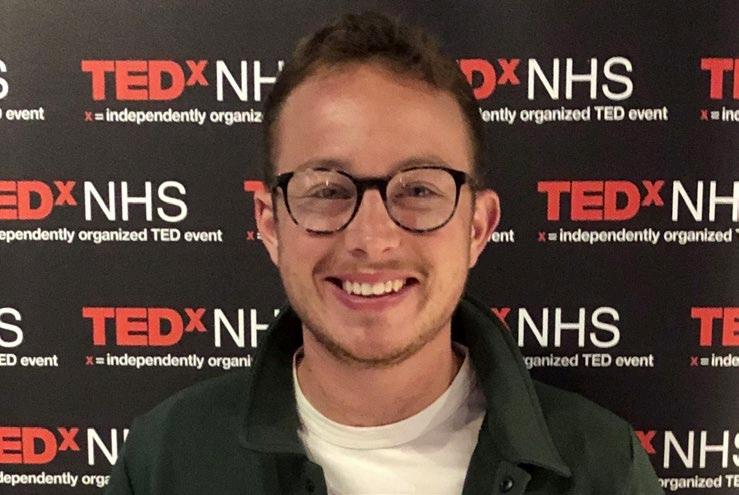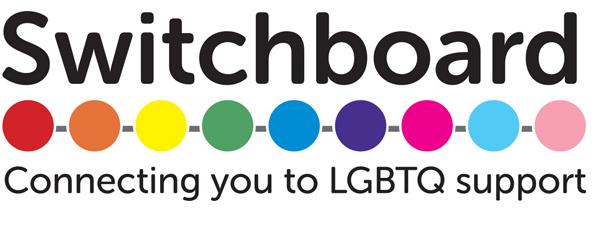
4 minute read
Jacob Bayliss
Jacob Bayliss Rory Finn catches up with LGBT Switchboard’s new chief executive officer
) In 2020, LGBT Switchboard turned 45 years old and in September Jacob Bayliss took over the helm as its latest CEO. “I’m passionate about the work that Switchboard does,” says Jacob, “Working with the community that I’m part of. Being able to lead an organisation that has this amazing history. There is a weight of responsibility and it’s a strange time to start”. Jacob pays homage to the hard work of former CEO Lyndsay Macadam and the rest of the team who managed the organisation through the crisis point early in the pandemic. To celebrate the 45th year they were planning to have a big knees-up, but it was scuppered by Covid restrictions. The team have kept their spirits up and will celebrate in what ways they can. They are currently in the middle of a fundraiser which sits at £3,700. You can donate by going to http://
Advertisement
bit.ly/KeepSwitchboardSwitchedOn What’s in store for Switchboard in 2021?
The first part of 2021 is about recovery and renewal. We connect people with each other; to their peers, to the community, and to services. That has been a challenge in 2020. LGBTQ+ people in Brighton & Hove and further afield who are struggling to find support can come to Switchboard. We’re more than a helpline. There’s a lot of potential to be tapped. Our Disability Project has been incredible. We learned a lot in our initial response to the pandemic. There are things we could have been doing all along. Shame on us as a society for not seeing that earlier. Lockdown forced us to be more creative in order to be more accessible. Restrictions day to day isn’t new for many people living with disability or who are chronically ill. They’ve needed this for a long time. As evidence, membership of the Disability Project has exploded, with interest in the project coming from all over the world.

Moving to a digital platform doesn’t work for everyone. The Rainbow Café, which supports people affected by dementia or memory loss, has found this particularly challenging. But other services for older people are thriving. Going to allotments and woodlands has been amazing. We’ve been able to do walks, woodcraft, and a winter solstice get together and provide transport for people to come along. This year has made loss and grief harder and has brought up difficult feelings from past bereavement. Grief Encounters gives people a space to connect with each other. There will be online Grief Encounters in February, which you can self-refer to. Our other projects continue to be well subscribed including Trans Survivors, Trans Link and our helpline is still running.
Do you feel visible as a trans person?
I was on panel recently and someone said there were no trans people on the panel. I didn’t have the energy to correct them. However nobody else, who knew otherwise, said anything. Made me laugh but shows the cognitive dissonance people have around what trans is and looks like. Being invisible can be a blessing but can at times be painful too. I assume that people assume that I’m cis and gay. If people Google me they’d know differently. The mere presence of me doesn’t mean we’ve achieved trans equality. One voice in the room, and a relatively privileged one, doesn’t mean we should be changing the conversation. We still need more trans leadership across the sector. Leadership needs to be diverse and come from all perspectives. Some organisations, including ours, are still on a journey to earn the trust of marginalised groups and listen to people. There are some amazing grassroots organisations like QTIPOC Narratives and Radical Rhizomes, from whom we can learn rather than duplicate. Everyone brings the lens you see the world through. For queer trans men, there are still a lot of gaps that need addressing. I spoke to a gay man recently who felt services weren’t for him any more as there were communities more in need or more vulnerable. This just isn’t true, and Switchboard is here for the whole LGBTQ+ community. Building bridges between old-school gay men and the wider and diverse community.
Who are your role models?
I’ve looked up to people here in Brighton and in Melbourne, particularly trans men who I could see myself in. They were demanding the trans community was resourced. I’ve been really inspired by that. Remember the feeling of seeing someone you felt reflected you at succeeding. Doing well in work, staying alive, etc. Good leadership is providing a consistent sense of opportunity and recognition. Organisations and leaders make space for others. I’ve put on a pedestal and hero worshipped those people. I could have never done what I did without them. They made a massive difference to me. We should be mindful that whatever stage we’re at, there are people looking to us.
What advice would you give to a young LGBTQ+ person?
Explore the things that matter to you. The more you look you’ll see LGBTQ+ people doing amazing things all over the space. The queer history of Charleston has been hidden, but we are exploring that now. We are working on an intergenerational buddying project which launches in the spring. Young people can come forward to see what’s out there and what possibilities there are. There shouldn’t be any doors closed. D To find out more and about Switchboard:










